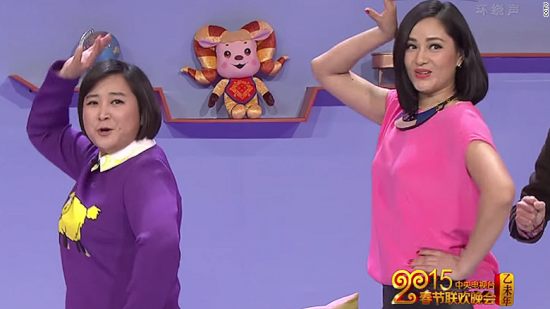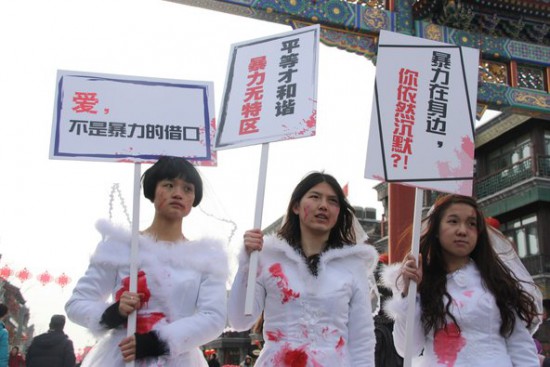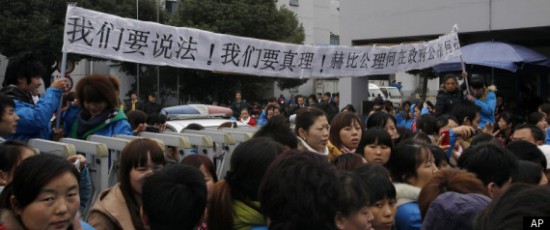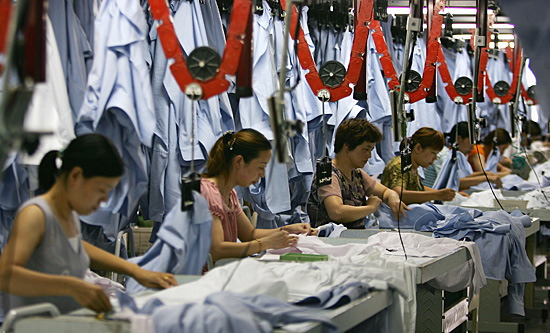Wage gap has widened and sex discrimination in the job market is rampant
Vincent Kolo, chinaworker.info
China Central Television’s gala to celebrate the Lunar New Year is reportedly the most watched television programme in the world. It is broadcast live on 189 state-run channels and the viewing audience, despite falling in recent years, is more than 600 million people. The four-and-half hour spectacle is also shamelessly sexist, with this year’s programme aired on 18 February hitting a new low in the opinion of women’s rights activists and many others who have spoken out on China’s vast but tightly policed social media.
“The gala shamelessly discriminated against and made fun of women. Are the directors taking us back to imperial times when women had to bind their feet?” This was just one of thousands of angry posts on Weibo, China’s version of twitter, after this year’s gala. A feminist inspired petition has slammed the show as “poisonous” pointing out it made 44 jokes at the expense of women – single women as “leftover” and female civil servants as “gold diggers” (prepared to hop into bed with their male bosses to gain promotion). These protests are fresh evidence that a new generation of women activists is emerging in China, protesting against domestic violence and discrimination in the job market. In several cities female activists have staged protests by occupying men’s toilets, to draw attention to the lack of facilities and longer queues for women. This, remember, is under a hardline dictatorship that clamps down fast on any protests.
The furore surrounding the annual TV gala throws a spotlight on a much bigger problem. The social position of women is being pushed backwards as part of the wider social counterrevolution that has occurred in China, with capitalism replacing state planning and recreating rampant inequality between rich and poor, city and countryside, eastern and western regions.

Wage gap widens
“The market economy has led to increased gender inequality since the 1990s,” noted feminist writer Lijia Zhang (China File 11 June 2014). This is reflected in the widening wage gap between women and men, a development that runs counter to international trends where wage differentials have narrowed although they still disfavour women. According to official statistics urban women in China in 2010 earned on average 67.3 percent of men’s earnings, down from 78 percent in 1990. In the countryside, women make just 56 percent of men’s wages.
Women white-collar workers face a wall of sexist attitudes and open discrimination. Even the New York Times (20 February 2015) acknowledges that, “In the office, Socialist-era egalitarianism has been replaced by open sexism, in some cases reinforced by the law.” The newspaper quotes Chinese feminist Feng Yuan, “Women’s status has not improved, and in some areas has regressed.”
Some facts that illustrate the negative trend:
- A 2010 survey showed that 69 percent of employers set gender conditions when recruiting staff, despite this being illegal. It is common for advertisements to specify that “only men need apply”, or only “attractive women”.
- Female participation in China’s labour force is high by world standards, but the proportion of urban women in employment has declined from more than 77 percent two decades ago to 61 percent.
- Rural farmland title deeds are mainly in male hands, with less than a fifth of these contracts including wives’ names. In the event of divorce women are often left empty-handed.
- Millions of Chinese undergo cosmetic surgery each year. In Beijing, female senior high school and college students make up over 80 percent of plastic surgery patients – a fact that is undoubtedly linked to intense pressure in the job market through the widespread use of physical appearance requirements in job advertisements.
Discrimination against women in the job market is now common and quite open, despite this being illegal. Employers hardly bat an eyelid about running openly sexist job advertisements because such reactionary attitudes have become socially acceptable. A survey last year by People’s University in Beijing showed that when an identical resumé was sent to job agencies but with a different sex, male graduates had a 39.2 percent higher chance than female graduates of being called to an interview. The figure for postgraduates rose to 53 percent. As in every society such gender attitudes invariably come from the top, from the ruling layer, as exemplified by CCTV’s New Year Gala shows.
The People’s Daily even featured a photo exhibition entitled “beautiful scenery” showing women hostesses working at the 18th Congress of the ruling Communist Party (CCP) in 2012. The unmistakable message from this is that women provide decoration while men make the decisions. Socialist blogger, Wang Linyu says capitalism is profiting from the idea of “leftover women” and preying on the anxieties and family pressures associated with a woman not finding a partner. More than one hundred dating websites have sprung up in China and in just the first quarter of 2014 this market was worth 490 million yuan (US$78 million) according to Bloomberg Businessweek (18 August, 2014). “They are trying to stigmatise and marginalise the so-called leftover women to make more money” says Wang. “A related trend is the boom in schools of female virtuosity (女德学堂) which promote feudal ethics to serve today’s capitalist society.”

Revolution and counterrevolution
During the Maoist era of state planning such blatant discrimination was checked by the role of the state which, despite the downside of massive bureaucracy, allocated all jobs and therefore acted to narrow the gap between women’s and men’s work, pay, and social standing. Alongside state ownership and regulation there was tremendous social pressure from women, reflecting a significant feminist current within the Chinese left, and from the radicalised population, to cast off the old patriarchal-feudal ways. In 1950, Mao’s government banned arranged marriages and the concubine system, and made divorce easier for both sexes. This was one of the most dramatic governmental shake-ups in the field of marital relationships ever attempted.
These changes did not amount to full equality for women, nor could this be described as ‘socialism’ as the CCP claimed. But despite Mao’s dictatorial rule – something anathema to real socialism – the crucial existence of a state-owned and planned economy opened an important door towards women’s emancipation which the subsequent capitalist counter-revolution is trying to close.
Gender discrimination is if possible even worse on the factory floor than in the office. A survey of more than one million internet recruitment postings found that while overall more than ten percent openly stated a gender preference, this rose to 23 percent for jobs that did not require a college education.
Women workers
Women in both office and factory employment face illegal pressure to sign “no pregnancy” clauses, to undergo pregnancy tests, and even sign pledges not to marry. When a woman worker becomes pregnant it is not uncommon for a boss to reassign her to uncomfortable, arduous work or long hours to pressure her to quit. It is widely feared that the government’s recent relaxation of the ‘one child policy’ to allow more urban couples to have a second child can actually blowback against women, increasing discrimination in the job market. Sexual harassment is if anything even more flagrant in factories than among white-collar staff. In a 2013 survey by the Sunflower Women Workers Centre, 70 percent of women factory workers in Guangzhou said they had suffered sexual harassment, with 32 percent reporting unwelcome physical contact and 25 percent receiving obscene phone calls or messages.
Yet as the past year’s strike movements show, women factory workers are anything but the servile worker bees the employers imagine. With the number of strikes doubling in 2014 compared to 2013, women workers came to the fore in many struggles and not least the massive Yue Yuen conflict of one year ago. This was China’s biggest strike in three decades and women footwear workers made up 70 percent of the strike force, dispelling any notion they are less determined than their male co-workers. These developments are grounds for great optimism that China’s fledgling women’s movement can link up with the unfolding struggles of the working class to build a force that will overthrow the current system and destroy the roots of women’s oppression once and for all.





